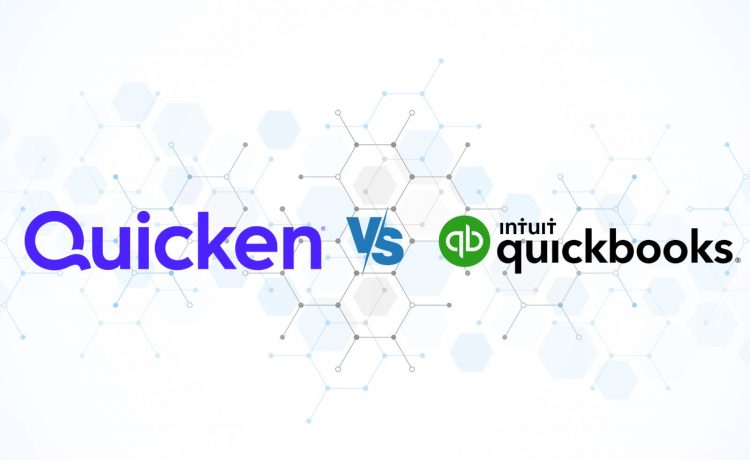Although Quicken and QuickBooks sound related, they’re entirely different small-business accounting platforms.
Quicken costs less but lacks power, but it’s undoubtedly better for beginners and simpler operations, though you’ll need a dedicated desktop computer for the task.
Meanwhile, QuickBooks Online is more advanced. It can stick with you through any stage of growth, and since it’s cloud-based, you can use it from any device. But it is more expensive and challenging to learn.
Let’s discover which accounting software brand is right for your business.
Quicken vs. QuickBooks Online: Comparison table
| Starting price for business plan (monthly) | ||
| Cloud-based | ||
| User-friendly | ||
| Supports multiple users | ||
|
|
Quicken vs. QuickBooks Online: Pricing
If you’re worried about saving money, then Quicken is the better bet. It’s much more budget-friendly and boasts a simpler subscription scheme.
But if you’re willing to pay more for richer features, then QuickBooks Online wins.
Quicken’s pricing
- Simplifi: $3.99 per month, billed annually, for a total of $47.88 per year.
- Classic Deluxe: $5.99 per month, billed annually, for a total of $71.88 per year.
- Classic Premier: $7.99 per month, billed annually, for a total of $95.88 per year.
- Classic Business & Personal: $10.99 per month, billed annually, for a total of $131.88 per year.
There is no free trial available for any plan. But all offerings include a 30-day money-back guarantee if you’re unhappy.
QuickBooks Online’s pricing
- Simple Start: $30 per month.
- Essentials: $60 per month.
- Plus: $90 per month.
- Advanced: $200 per month.
Unlike Quicken, QuickBooks Online allows you to snag a month’s free trial on all options. Alternatively, you can get 50% off the first three months, but if you choose the price cut, you can’t get the free trial.
If your budget allows, you can also tack on Intuit’s other offerings, like TurboTax and QuickBooks Payroll. These robust additions make this title a better value in the long run if you have ambitious growth plans.
Quicken vs. QuickBooks Online: Feature comparison
Scalable setup
Winner: QuickBooks Online
As mentioned above, QuickBooks Online is the clear winner for long-term scalability. Its tiered subscription plans provide tailored solutions for all stages of growth. You can start simple and later expand to the high-end Advanced plan. Compare this to Quicken’s singular Business & Personal version, which lacks this scalability.
Personal finance integration
Winner: Quicken
Quicken shines when it comes to integrating personal financial management with business accounting. Its platform naturally melds the two realms seamlessly under one roof. This all-in-one financial management approach is perfect for sole proprietors and freelancers who need to manage their personal and business expenses in tandem.
Invoicing
Winner: QuickBooks Online
With its advanced invoicing features, QuickBooks Online stands out. Users can create custom, professional invoices, set up recurring billing and accept payments online. This comprehensive suite of invoicing and payment tools is ideal for businesses with complex billing needs or those looking to streamline their accounts receivable processes.
Investment tracking
Winner: Quicken
Quicken is the go-to for comprehensive investment tracking. It offers detailed tools for monitoring stocks, certificates of deposit and real estate, among other financial vehicles. Perks include performance tracking, portfolio analysis and access to Morningstar research. Plus, landlords can track occupancy rates, maintenance requests and more from within the software.
User-friendly interface
Winner: Quicken
Quicken wins in terms of user-friendliness. Its beautiful, simple interface is specially designed for individuals without a background in accounting. As a result, you can quickly get started with the title without worrying about jargon-filled complexities. This straightforward approach is particularly convenient if you have multiple people of various skill levels handling accounting.
Analytics
Winner: QuickBooks Online
QuickBooks Online excels in providing deep financial insights through its reporting and analytics. The platform generates boatloads of customizable reports that cover everything from basic profit and loss statements to complex cash flow forecasts. This breadth and depth of reporting capabilities make it invaluable for businesses that rely on data-driven decision-making.
Multiple users
Winner: QuickBooks Online
QuickBooks Online also takes the lead in multi-user accessibility. It allows multiple users to use the software with different levels of permissions, facilitating collaboration among team members while ensuring data security. This feature is essential for businesses relying on several employees to tackle finances simultaneously.
Financial analysis
Winner: Tie
Both Quicken and QuickBooks Online offer comprehensive overviews of your financial situation. Quicken specializes in welding personal and business finances under one roof, which is ideal for sole proprietors and freelancers.
On the other hand, QuickBooks Online offers a more detailed business financial perspective. These richer analytics and enterprise-centric focus are great for serious entrepreneurs seeking ambitious growth.
Quicken pros and cons
Pros
- Combines personal and business finances seamlessly.
- Investment tracking tools included.
- Beginner-friendly.
Cons
- Limited scalability.
- Microsoft Windows-centric (limited Mac edition and no cloud-based option).
- Less customizability.
- Limited analytics.
QuickBooks Online pros and cons
Pros
- Strong scalability and broad features.
- Lots of integrations with Intuit and third-party software.
- Advanced analytics included.
Cons
- Steeper learning curve than Quicken.
- Pricier.
- No desktop option (requires separate QuickBooks Desktop subscription).
Should your Organization use Quicken or QuickBooks Online?
Choose Quicken if:
- You manage personal and business finances together.
- You need detailed investment tracking.
- Ease of use is a priority.
- You have a tighter budget.
Choose QuickBooks Online if:
- Your business is growing (or plans to).
- You rely heavily on invoicing and billing.
- You need comprehensive reporting and analytics.
- Integration with other software is crucial.
- Collaboration with colleagues and others is key.
Methodology
We carefully evaluated each platform’s features, pricing, analytics and suitability for various business sizes. We also studied specific abilities such as financial tracking, invoicing, reporting and scalability. Finally, we analyzed honest customer feedback and investigated the overall value in the long term for both platforms, among other factors.







